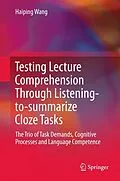This book explores the effectiveness of listen-to-summarize tasks as a tool to assess lecture comprehension ability. It especially focuses on listen-to-summarize tasks that represent listeners' meaning building and the discourse construction of the lecture for listening assessment purposes.
Autorentext
Dr. Haiping Wang is a postdoctoral and postgraduate supervisor at East China University of Political Science and Law, Shanghai. She holds a PhD in the field of Language Assessment from Shanghai International Studies University and was a visiting scholar at the University of Bristol's Graduate School of Education. Her recent publications include: Wang, H. (2017). A Review of Studies on Cognitive Processes in Language Testing, Foreign Language Testing and Teaching (the only journal of language testing in mainland China); Wang, H., Zheng, Y. & Cai, Y. (2015). Application of Corpus Analysis Methods to the Teaching of Advanced English Reading and Students' Textual Analysis Skills, Zou, B. Hoey, M. & Smith, S. (Eds), Chinese Corpus Linguistics, published by Palgrave Macmillan (peer review); Wang, H. & He, Z. (2013). Public Diplomacy and the Co-Evolution of China and Europe, Frauke Austermann (Ed), China and Europe in 21st Century Global Politics: Partnership, Competition, or Co-Evolution, Cambridge Scholars Publishing (peer review); Wang Haiping (2014). Construction of Cognitive Context in Teaching Reading and Corpus Use, Foreign Language Education in China (CSSCI).
Inhalt
Chapter 1 Introduction.- Chapter 2 The Theory of Academic Lecture Comprehension.- Chapter 3 Using Listen-to-summarize Tasks to Assess Lecture Comprehension.- Chapter 4 Task Characteristics of TEM 8 Mini-lecture Comprehension.- Chapter 5 Exploring Task Demands of TEM 8 Min-lecture Tasks.- Chapter 6 Employing Tap Methods to Explore Listeners' Cognitive Processes.- Chapter 7 Designing Recalling Tasks to Explore Listeners' Mental Representations of Two Mini-lecture.- Chapter 8 Linking Task Demands, Cognitive Processes and Language Competence.- Chapter 9 Conclusion and Recommendations.
